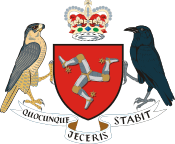Judiciary of the Isle of Man facts for kids
| Isle of Man |
 This article is part of the series: |
|
|
|
|
|
The Isle of Man has a system of courts to help keep things fair and make sure laws are followed. These courts handle different types of cases, from small disagreements to more serious matters. They work together to make sure justice is served for everyone on the island.
Contents
Courts in the Isle of Man
The court system in the Isle of Man has different levels, like steps on a ladder. Each level handles certain kinds of cases.
What are the Lowest Courts?
The courts at the lowest level are called the Summary Courts. There are also special courts like the Coroner of Inquests, the Licensing Court, and the Land Court. These courts deal with everyday legal issues and less serious cases.
Who are the Magistrates?
These lower courts are led by people called magistrates. There are two full-time magistrates, known as the High Bailiff and the Deputy High Bailiff. There are also many part-time magistrates, called Justices of the Peace, who are volunteers from the community.
The High Court of Justice
The next level up is the High Court of Justice of the Isle of Man. This court has two main parts. One part, the Civil Division, handles disagreements between people or groups. The other part, called the Staff of Government Division, deals with appeals.
Who are the Judges?
The main judges in the High Court are called Deemsters. They are chosen by the Queen, with advice from the UK's Secretary of State for Justice. There are also other judges called Judicial Officers. These officers are chosen by the Lieutenant Governor of the Isle of Man. The High Bailiff and Deputy High Bailiff are also Judicial Officers. Sometimes, other Judicial Officers are appointed for specific cases where their special knowledge is needed.
How Cases are Heard
Different types of cases are heard in different ways, depending on how serious they are.
Civil Cases
When people have a disagreement, like about money or property, it's called a civil case. These cases are usually heard first by a single Deemster in the High Court. The Deemster listens to both sides and makes a decision.
Criminal Cases
If someone is accused of breaking a law, it's a criminal case. Less serious criminal cases are heard by the High Bailiff, the Deputy High Bailiff, or a group of volunteer magistrates. More serious criminal cases are heard by a Deemster in a court called the Court of General Gaol Delivery. In these serious cases, if the person says they are not guilty, the Deemster works with a jury of seven people. For very serious crimes like treason or murder, the jury has twelve people.
Appealing a Decision
If someone doesn't agree with a court's decision, they can ask for an appeal. This means a higher court reviews the case.
Final Appeals to the UK
Appeals for both civil and criminal cases are handled by the Staff of Government Division. Usually, a different Deemster (one who wasn't involved in the first hearing) and a Judge of Appeal hear these cases. The very final appeal for cases from the Isle of Man can go to the Judicial Committee of the Privy Council in the United Kingdom. This is a very old right that allows people from the Isle of Man to ask the Crown of England to review court decisions. This right still exists today.
Related Pages
- Manx law
- Isle of Man Constabulary
- Tynwald
 | Audre Lorde |
 | John Berry Meachum |
 | Ferdinand Lee Barnett |

